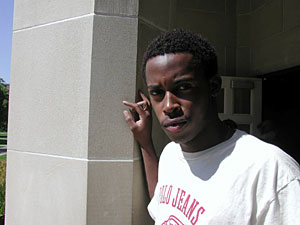|
Audio
Photos
Your Voice
|
Colleges and universities see drop in international students
September 28, 2004
 |
| Until Sen. Norm Coleman intervened, the government turned down Humphrey Tusimiirwe's request for a visa. (MPR Photo/Marisa Helms) |
St. Paul, Minn. — Wearing a T-shirt and jeans, Humphrey Tusimiirwe, 23, is just another freshman at the University of St. Thomas. But the student from Kampala, Uganda, almost didn't get here to start classes. The war on terrorism got in the way.
Despite a glowing recommendation from the university's president, the U.S. Consulate in Uganda repeatedly turned down Tusimiirwe's visa application.
"There's really smart people that want to come over here, but are forced to explore other options because it's really arduous process, it's really tough," Humphrey said. "And that's being modest."
People who want to come to the U.S. on a student visa need to fulfill a variety of requirements, including paying $100 for each application. Applicants must also show proof of family ties to their home country. Marriage, financial stability and real property are considered proof to the U.S. government that a student will return to his home country after finishing his studies.
But Tusimiirwe's father is deceased, he's single, and has no assets.
His application was finally approved on the third try, but only after Sen. Norm Coleman, R-Minn., intervened.
Coleman says he was so impressed with Tusimiirwe's difficulties, he's trying to help other students. He's sponsoring a bill would give consulates more discretion in assessing individual visa applications.
Coleman says making it easier for foreign students to study in the U.S. will actually improve national security.
"We're seeing a significant decline in the number of applications from students all over the world," Coleman said. "And these young people in 20 and 30 years are going to be the leaders of their own countries. And we're going to have missed the opportunity to educate them in American institutions and to acquaint them with American values and American ideas."
A new study by the Council of Graduate Schools, an organization focused on improving and advancing graduate education, highlights the problem. The report shows a 32 percent drop in graduate school applications from 2003 to 2004.
Officials at the University of Minnesota say the number of new international students, graduates and undergraduates, is down 16 percent this year. Officials from the University of St. Thomas say they don't have numbers for fall 2004, yet, but international enrollment at St. Thomas declined 17 percent from 2002 to 2003.
Though students make up only about two percent of visitors holding non-immigrant visas, federal officials like U.S. Immigration and Customs Enforcement spokesman Tim Counts, say there are good reasons for the increased scrutiny.
"A fairly high percentage of the people who have been determined to be terrorists were involved in student visa issuance in one way or the other," Counts said. "So the government, and I don't think Congress, is saying that students are terrorists. What we're saying is that terrorists have used the student visa system as a way to gain entry to the country."
But, even strong supporters of national security like Sen. Coleman say the recent tightening of visa applications may have been be an overreaction.
Those who advocate for foreign students and the institutions serving them applaud Coleman's bill.
Marlene Johnson, director of the Association of International Educators, says difficulties obtaining visas and the associated costs have had a chilling effect on students looking to study abroad.
"There's a lot of competition for the best and brightest international students, and so as we make things more difficult and the other english speaking world makes things easier, we are at a growing disadvantage and that's our concern," Johnson said.
A congressional committee could hear Coleman's International Student and Scholar Access Act before the end of the year.
|
News Headlines
|
Related Subjects
|
